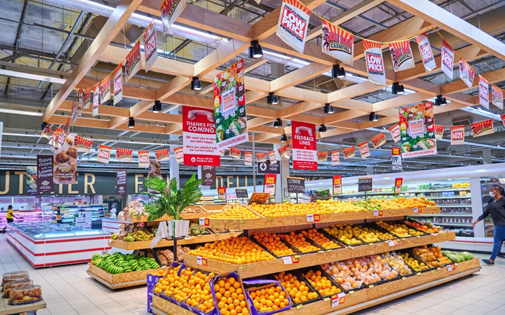For nearly two decades, Shoprite was the beating heart of modern retail in Nigeria. Families flocked to its outlets every weekend, children tugging shopping carts down brightly lit aisles stacked with imported chocolates, fresh produce, and local staples. But today, those once-bustling stores are shadows of themselves, some locked up entirely, others reduced to barren aisles that tell a story of decline.
In Ilorin, Kwara State, what used to be a lively meeting spot for friends and families now sits abandoned, doors shut tight after months of dwindling patronage. In Ibadan, the Ring Road and Mokola branches were sealed with notices citing “circumstances beyond immediate control,” leaving residents stunned.
Even the Ikeja City Mall, once hailed as Shoprite’s crown jewel and the busiest retail hub in Nigeria, is now struggling to keep its shelves full. A handful of groceries linger in scattered sections, the buzz of shoppers replaced by a hollow stillness.

Whispers of a complete exit from Nigeria are growing louder. Yet, staff at the Ikeja branch insist otherwise. According to Oluwatosin, a store administrator, the crisis is less about abandonment and more about transition:
“There’s a new management in place,” she explained. “They’re currently renegotiating with suppliers and vendors. Once that’s sorted, we’ll restock the shelves. It’s a process.”
Shoprite’s story in Nigeria began in 2005 with a grand entry into Lagos. It wasn’t just another store; it was a new way of shopping. Over the years, it grew to more than 25 outlets, provided jobs for over 2,000 Nigerians, boosted local farmers through its supply chains, and became part of the urban lifestyle.
But the cracks began to show. Inflation spiraled, the naira weakened, rent soared, and competition from nimble local supermarkets and online platforms intensified. By 2020, Shoprite Nigeria was already carrying more liabilities than assets. When the South African owners sold out to Nigerian investors led by businessman Tayo Amusan’s Ketron, the dream was to revive the brand. Instead, the challenges only deepened.
Now, as shoppers wander through empty aisles or stand before shuttered doors, the decline of Shoprite feels deeply personal. For many Nigerians, the store wasn’t just about groceries; it was a piece of modernity, a weekend ritual, a place to gather.
The chain’s struggle mirrors a broader exodus of multinational companies from Nigeria. Giants like GlaxoSmithKline, Procter & Gamble, Sanofi, and Bolt Food have all packed up, citing the harsh business climate. Economists warn that unless Nigeria becomes friendlier to investors, Shoprite may not be the last casualty.
For now, the question lingers: Can Shoprite find its footing and reclaim its space in Nigeria’s retail culture, or will it fade into memory as another fallen giant?




